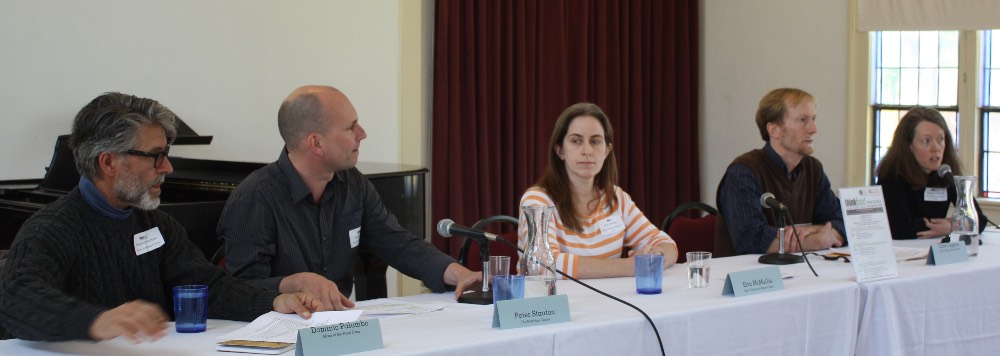Center for Food Studies 2016 ThinkFood Conference

Third Annual Round table Focuses on Berkshire Foodways
The Center for Food Studies at Bard College at Simon's Rock, now in its third year, announced its annual ThinkFOOD Conference to be held on Saturday, April 9, 2016 from 10:00 a.m. to 3:00 p.m. in the Kellogg Music Center. This year’s theme is Berkshire Foodways. The 2016 ThinkFOOD conference will look inward at Berkshire County to define the “what, how, and where” of food in our region.
The conference will feature two panel presentations and a poster session by students in the current course “Foodways: Connecting Past, Person, and Place" taught by Katie Boswell, associate professor of Anthropology, and Alana Chernila, cookbook author and food writer.
The morning panel entitled "Grown/Made in the Berkshires" will ask local food producers "What is Berkshire food?" Panelists include Alana Chernila (author of The Homemade Pantry, The Homemade Kitchen, and her blog “Eating from the Ground Up”), Maddie Elling (owner of Hosta Hill, and award-winning producer of sauerkraut, kimchi, and other fermented foods), and Richard Bourdon (owner of Berkshire Mountain Bakery, and featured in Michael Pollan’s documentary series Cooked).
The lunchtime poster presentation will showcase research by students in the "Foodways"
course. Lunch—featuring local foods—will be served in the Simon’s Rock Dining Hall.
In the second panel, "Feeding the Berkshires", participants will answer the question: "What networks have been established to distribute food produced in the Berkshires?" Peter Stanton of The Nutrition Center will talk about the Berkshire Food Web directory he created to address food access challenges; Sarah Gardner from Williams College will speak about her research on food mapping in Berkshire County; Nick Martinelli from Marty’s Local will discuss his work-in-progress creating a Berkshire food hub; and Jock Herron from the Harvard Design School will share his experience helping to establish a food hub in Worcester, Massachusetts.
“Berkshire County offers special challenges and unique opportunities for food. With ThinkFOOD 3, we hope to create a dialogue that will illuminate Berkshire foodways for producers and consumers, connect potential partners for collaboration, and help to determine the best way forward for Berkshire food” said Professor Maryann Tebben, the head of The Center for Food Studies at Simon’s Rock.
Dr. Tebben’s work in food studies stems from her research in French literature. She has recently published a book entitled Sauces: A Global History (Reaktion Books, 2014) and an article on the history of French dessert in Gastronomica.
Due to limited seating, registration is required for the ThinkFOOD conference. The 2016 ThinkFOOD conference is sponsored by The Nutrition Center, Berkshire Grown, and Guido’s Fresh Marketplace. Admission is $15, (free for students) – lunch is an additional $10.
Previous ThinkFOOD conference themes include “Hunger in the Berkshires” and “Sourcing Local Food for Schools”. The Center for Food Studies’ future plans include the upcoming Edible Books Festival co-hosted by the Alumni Library, new food-related courses taught by faculty, further development of the campus community garden program, regular film screenings/lectures and discussions, and establishment of regular food-related internships. Dr. Tebben reported, “We are proud to have established two new internships this year related to cookbook writing and food access.”
 ABOUT THE CENTER FOR FOOD STUDIES: The Center for Food Studies provides a forum for collaboration, communication, and
learning across a variety of food realms by offering for-credit courses within existing
Simon's Rock programs; collaborating with community partners to sponsor lectures,
conferences, and other educational events on campus and across the region; creating
opportunities for students and local organizations to benefit from internships and
other work/study arrangements; and partnering creatively on and off campus to develop
awareness of critical issues related to food, leading to productive connections and
action. It advances the community’s knowledge of food as a cultural force and raises
awareness of our responsibilities as stewards of a sustainable food system.
ABOUT THE CENTER FOR FOOD STUDIES: The Center for Food Studies provides a forum for collaboration, communication, and
learning across a variety of food realms by offering for-credit courses within existing
Simon's Rock programs; collaborating with community partners to sponsor lectures,
conferences, and other educational events on campus and across the region; creating
opportunities for students and local organizations to benefit from internships and
other work/study arrangements; and partnering creatively on and off campus to develop
awareness of critical issues related to food, leading to productive connections and
action. It advances the community’s knowledge of food as a cultural force and raises
awareness of our responsibilities as stewards of a sustainable food system.